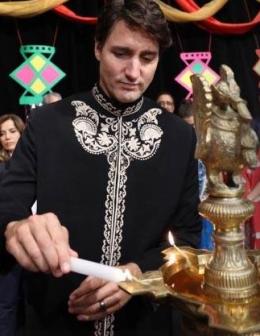Diwali Mubarak?

By Jagdeesh Mann (@JagdeeshMann)
Special to The Post
Canadian Prime Minister Justin Trudeau’s brand is built on a foundation of celebrating diversity and promoting multiculturalism. It is, as he is quick to point out, the source of Canada’s strength.
So the prime minister recently joyously tweeted, “Diwali Mubarak! We’re celebrating in Ottawa tonight.” The tweet included the hashtag “Happy Diwali.” He also attached a photo of him lighting a candle in honor of this Indian festival.
Diwali is considered one of the major holidays in India that is celebrated for five days during the autumn season, a few months before the New Year. It is the celebration of light over dark as mythologised by the epic South Asian story of the Ramayana in which Ram rescues his wife Sita from Ravana. In that rescue, Ram defeats the evil Sri Lankan king in battle.
Divas, or earthenware oil lamps, are lit symbolically by households across India to illuminate the return of a victorious Ram to India.
However, Trudeau’s particular post, as well-intentioned as it was, provoked sharp backlash from several netizens, particularly some from the Hindu community, due to his politically incorrect choice of word.
Trudeau’s mubarak was intended to reach out to Indians who are celebrating the biggest holiday in the South Asian nation. Mubarak is a word with Arabic roots – it may have come to India by way of Urdu, the language of the Mughal rulers who preceded the British Raj.
Regardless of how it ended up in the Indian vernacular, mubarak, which means “blessed”, has for centuries been universally spoken in the subcontinent as a means of offering congratulations, whether that be for the birth of a child, a new couple’s marriage, or the celebration of any number of festivals of various religious roots.
But with the hardening of divisions in India over the past three decades, fuelled by the country’s vicious communal politics, even words have become toxic if spoken outside of their religious spheres.
As Diwali has become ever Sanskritised into Deepavali in order to denote its Hindu roots, mubarak has become ‘Islamised’ and hence glued to Muslim celebrations such as Eid. Even lighting up Chinese made firecrackers for the celebration has become frowned upon has become an unpatriotic act under Narendra Modi's BJP Hindu-nationalist government.
This spirit of divisuve communal and identity politics has infiltrated all regional communities. Sikhs in India, for example, have increasingly bought into an ongoing rebrand of Diwali into Bandi Chhor Divas, a celebration with a uniquely Sikh narrative devoid of any of Diwali’s Ramayana roots.
Hence Trudeau’s tweet evoked the predictable ‘fauxrage’ from netizens doubling as Twitter’s religious police. Though some Hindus may speak Urdu, Trudeau’s use of an Urdu word has apparently still appalled many people.
So these netizens took to social media platforms to chide Canada’s wayward PM, pointing out that the appropriate greeting would have been “Diwali Ki Badhai.” The word “badhai” is translated as “congratulations” in Hindi.
They backed up their criticism by commenting on how the ‘festival of lights’, though still widely commemorated by Indians of various faith groups, is not as Islamic celebration. Some provided other appropriate ways to express one’s greetings in a more 'Hindified' manner such as “Diwali ki Shubhkamnayein” or “Shubh Deepavali.”
Though he did not correct or edit the tweet, PM Justin Trudeau posted a video on his official account to speak to his followers. He encouraged people to take advantage of Diwali to celebrate values such as “inclusion, pluralism, and respect for differences.”
By choosing tiki-torches over clay lamps in lighting the way to building community, these South Asian netizens missed an opportunity to spread Diwali’s radiance - a lesson inadvertently offered by a Canadian Prime Minister who just wanted to join the party.
(With notes from Blasting News)









